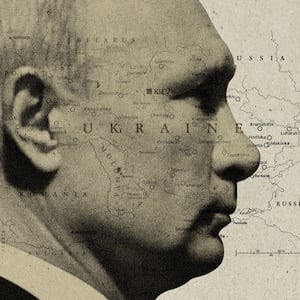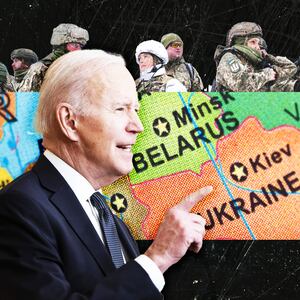How long is a night when you are huddled beneath a blanket on a subway station floor, holding your baby in your arms as missiles and bombs reduce the city over your head to rubble?
How long is a day when there is no water, no food, no electricity and no escape?
Time means something different in a war zone. It is more precious, more tortuous, more valuable, and more treacherous.
ADVERTISEMENT
When I spoke recently to a senior U.S. State Department official about the war in Ukraine, time was at the center of every point he made. It was the secret weapon of the Ukrainians and the greatest challenge they and their allies faced. Over time sanctions against the Russians would cause increasing pain. Over time mounting losses in Ukraine would generate ever greater opposition to Putin within his own country.
The official, a thoughtful, experienced national security hand, emphasized to me that we have to find a way to have patience. And he acknowledged the Russians knew that and that is why they were so determined to escalate attacks, to destroy cities, to inflict more pain on civilians. Because they knew that only if they did that they might force Ukraine to the negotiating table on favorable terms. They also knew that the longer this war went on and it became clearer and clearer that Russia could not achieve its goals, the weaker Moscow’s negotiation leverage would become.
In a way the role of time in this conflict has been turned on its head. Originally, it was predicted that a lightning strike against Ukraine by Russia’s massive, well-equipped army would produce instant victory. Major cities would be taken. The government would be decapitated and replaced. Russia’s might would intimidate Ukrainians and their neighbors into future capitulation to the whims of the dictator in the Kremlin.
But here we are approaching the four-week mark in this conflict and it is clear that did not happen. Russia has taken none of Ukraine’s major cities. Its blitzkrieg got stuck in the mud and taken apart by committed, resourceful, increasingly well-equipped Ukrainian troops. The tsar on his throne near the banks of the Moskva River was dwarfed on the world stage by the people’s president in Kyiv, an accidental politician who won the hearts and support of Ukraine’s citizens and the world while Putin’s stature grew ever smaller and his reputation ever more repugnant.
Russia, by conservative estimates, has lost more troops in the first three weeks of this war than the U.S. lost during the past two decades in its “forever wars” in Afghanistan and Iraq. While casualty estimates are unreliable, it seems only a matter of days or a week or two before Russia’s killed-in-action surpasses that country’s total losses in its own 10-year war in Afghanistan, a war so unpopular that it helped trigger the changes that led to the collapse of the Soviet Union. Western intelligence reports suggest Russia has made “little progress” in achieving its pre-war objectives in Ukraine.
Economic sanctions have hit Russia hard. Each ruble is worth less than a penny. More than 400 companies have announced they were pulling out of Russia or reducing the scope of their operations there. It is estimated that the sanctions will erase 30 years of Russian economic growth, virtually all that has occurred since the fall of the USSR. It is likely that more than 10,000 people have been arrested within Russia for protesting the war. Public opposition from artists, the media, and even Russian cosmonauts in the international space station has grown.
Massive flows of military and financial aid to Ukraine have poured in from the West. This past week, President Biden authorized additional significant weapons transfers. The Congress authorized almost $14 billion in spending associated with the war that includes more money to deploy troops and military supplies to Europe and almost $7 billion in foreign aid. Managing Western military aid flows to Ukraine is a massive undertaking and thus far, a remarkable achievement. In fact, it has been so vital to Ukraine’s success against Russia that the Kremlin has begun threatening to attack such flows.
Thus far, Russian threats to escalate have been among their few successful initiatives during this conflict. Putin’s warnings that have verged on threats of nuclear war have had the desired effect on Western planners, helping to quash discussions about more direct Western military involvement in support of Ukraine.
In the days ahead, U.S. officials expect such threats to increase, along with hints that chemical weapons use might be on the horizon.
U.S. officials speculate that the threats of escalation are a strategy by Putin to force a settlement while he still has some leverage and can escape this conflict with something that he can tell his people was a “win” and worth the sacrifice. A protracted war is, at this point, at least in the view of the senior state department official with whom I spoke, not to Putin’s advantage. That is why he emphasized the importance of letting the strategy of supporting Ukraine’s fierce resistance while waging something like intense economic warfare against Russia, be given time to work.
But he understood the risks. There will be atrocities. In fact, because Putin recognizes he cannot achieve either his goal of swift victory nor can he afford the costs of protracted urban warfare to take key cities or hold them against an insurgency, it is only through atrocities that he can hope to break the will of the people of Ukraine and pressure them into settling for some ceasefire terms the Russians might find acceptable. The problem for the west is that such atrocities will certainly trigger increasing pressure to do more for Ukraine and in so doing, they vastly increase the risks of military confrontation between Russia and NATO and the even greater losses of life and property that would likely entail.
The Western strategy demands time. The Russians feel time is one thing they cannot afford. The consequence is that in the very near future this already horrific war is likely to grow even more intense and its human toll is likely to soar. Each day’s toll is likely to grow higher, perhaps much, much higher.
That means for many in Ukraine there is very little time left. And for others, the minutes and hours ahead will be excruciatingly difficult. That is why, in the end, whatever the strategy or plans being developed in Western capitals, it must be left entirely up to the Ukrainians to determine whether and for how long they should endure the sacrifices of fighting on.
Putin will try to break their spirit. So far, he has not only failed to do that, his brutality has had an unintended consequence. It has seemingly given the people of Ukraine an even greater will to fight on. The consequence? With each passing day it seems the strategy of Ukraine and its allies is working. With each passing week, it increases the chances the people of that beleaguered but immensely courageous country will be able to claim this moment in history as their own.







